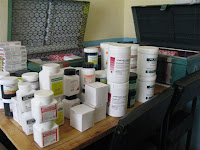
One of the joys of our work at Maseno Missions is facilitating sustainable community-based projects. In the process, it is a gift to be able to encourage Kenyan women to believe in themselves and in their futures. Frequently the sole supporters of their families as well as their neighbors' child-headed families, they braid sisal into rope, roll paper into beads and work the land-- if
they
have land.
They cook uggi/porridge over open fires, hand wash laundry in a bucket or a stream, and sweep dirt floors with tied-twig brooms. Kenyan "mamas" work from sun up until sun down with little, if any, recompense and little, if any, complaint. All they have left at the end of the day are weary muscles and bent or broken bodies -- and not just their own. Life expectancy in Kenya is 25 years lower than in the U.S. Many of these women are so busy coping with the sick, the dying and the orphaned that they are unable to braid, or bead, or work anyone's land, although the season of the long rains has finally begun.

Nan Hardison has done an incredible job of empowering women and children with the ACK Mothers' Union and the Orphan Feeding Programs. Those programs are now micro-lending operations and are expanding to all 41 parishes in the Diocese of Maseno North. With her encouragement and Gerry Hardison's professional assistance, I've been helping four Kenyan nurses establish community pharmacies in Ebwali and Ekwanda. These pilot projects were funded by Boston pediatrician Christiana Russ, who has visited Maseno on several occasions.We have all been concerned about our patients' inability to comply with their prescribed medications. Our hospital and pharmacy are some distance from the highway, but more convenient suppliers are expensive and/or inconsistent, at best.
We want our neighbors to be able to buy affordable medications without wasting money on either dangerous matatus (taxi vans) or counterfeit drugs. The local chemists and dukas/shops currently sell "treatments" of all sorts. Prescriptions are not required for antibiotics, and there are no guarantees as to the quality or the appropriateness of the items dispensed. (It doesn't help to take one dose of quinine for malaria or two doses of Septrim for a bacterial infection. If that's all folks can afford, though, that's all they buy. And that's how drug resistance is born.)

Our satellite pharmacies are fully subsidized at start-up so the nurses can provide good drugs at good prices. The drugs are purchased through the hospital pharmacy and MEDS, its reliable supplier. The nurses will sell only full-dose packets of medication. They will base the pharmacies at their respective churches, and they will, together, determine the business hours appropriate for their own communities.They will earn 10% percent of their sales, the Orphan Programs 10% of the sales, and the remaining 80% will be reinvested in medications and supplies. They know that their pharmacies must be self-supporting after the initial investment.

The original funds were used to purchase a quantity of 50 separate items for sale, bandaging materials and syringes for professional use, and four locking chests. The nurses have met several times over several months to brainstorm together and to establish protocols. They will provide limited clinical services (dressing changes, for example), as well as medications. They themselves priced the drugs for sale, and they themselves have determined what would sell in their markets. The nurses requested a large supply of Triatix poison for treating jigger infestations and an even larger supply of Formalin for embalming bodies. Death confronts us daily.

Community pharmacies are not new to aid-based efforts in Africa. They are not new to Kenya, either -- dating back to 1978 and the well-intentioned Declaration of Alma-Ata in the USSR. The concept was revisited in Mali in 1987 and called "The Bamako Initiative." According to a local clinical officer, many of those efforts failed for many reasons, in part financial and in part cultural. A major problem, he says, is that, throughout Africa, loyalty to one's family/tribe is paramount. At its best, that fosters the loving concern we see shown by the Mothers' Union volunteers in Maseno. At its worst, it fosters the violence the world witnessed in early 2008. Regardless, one of the difficulties with which every Kenyan must contend is the sometimes desperate need within his or her "family."
It is simply not OK to turn a family/tribal member away. The pressures are great upon anyone-with-anything to give it to members in need. The reality of that need is intense, so if things aren't given, things are sometimes taken. It is not about theft as much as it is about starvation. Because our nurses are Mothers' Union volunteers who support orphans of their own and have some experience with micro-enterprise, we hope these fledgling pharmacy initiatives will work for them and for their communities this time. Please give thanks with us for Christiana's support; and please keep Magi, Noel, Rosemary and Elizabeth in your prayers.

Today is Labor Day, a holiday in Kenya. These beautiful women won't get one, but they deserve a holiday -- and so much more. Meet Noel (L) and Rosemary (R)... and Magi (center), Jane (R) and Kwendo (far left), their first customer!

 Our parents taught us to always write thank-you notes. At Mom's graveside service last weekend, we celebrated a life well-lived and well-loved. I read aloud a Mother's Day litany of thanks I'd sent to her in 1965. It had been tucked inside the family Bible for safekeeping.
Our parents taught us to always write thank-you notes. At Mom's graveside service last weekend, we celebrated a life well-lived and well-loved. I read aloud a Mother's Day litany of thanks I'd sent to her in 1965. It had been tucked inside the family Bible for safekeeping.




